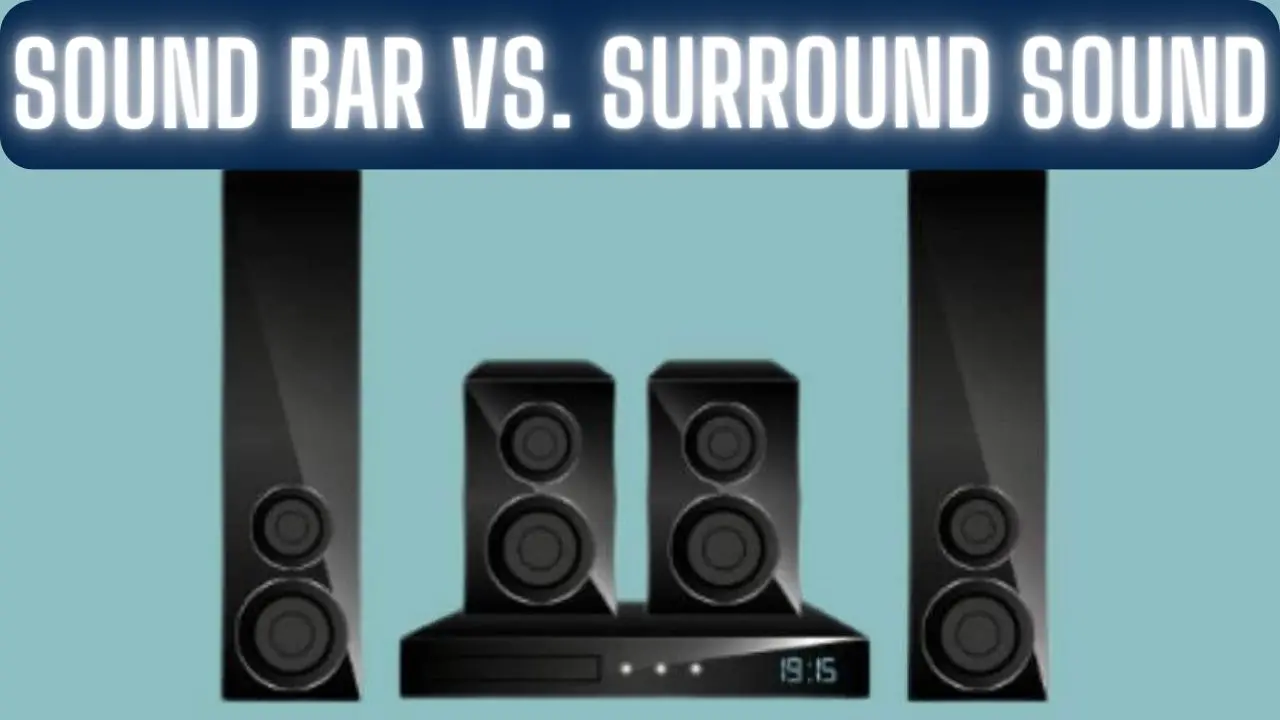Sound Bar vs. Surround Sound: Choosing the Right Audio Setup for Your Home
Introduction
When it comes to enhancing your home audio experience, two popular options stand out: sound bars and surround sound systems. Both offer improved audio quality over built-in TV speakers, but they differ in terms of setup, performance, and budget. In this article, we’ll explore the differences between sound bars and surround sound systems to help you make an informed decision for your home entertainment needs.
Sound Bar:
- Design and Setup:
- A sound bar is a sleek and compact speaker system that typically consists of a single elongated speaker enclosure.
- It’s designed to sit either on a shelf below your TV or be mounted on the wall, providing a simple and space-saving audio solution.
- Setup is straightforward, often requiring just a few cables to connect to your TV.
- Audio Quality:
- Sound bars offer a significant improvement over built-in TV speakers, delivering clearer dialogue and enhanced sound quality.
- Many sound bars come with built-in subwoofers or support for external subwoofers to provide better bass response.
- Surround Sound Emulation:
- Some advanced sound bars use technology like virtual surround sound to simulate the immersive experience of a multi-speaker surround sound system.
- While not as authentic as a true surround sound setup, it can still provide an engaging audio experience.
- Price Range:
- Sound bars come in a wide price range, making them accessible to various budgets. Basic models offer good value for the price, while premium sound bars offer higher audio fidelity.
Soundbar – Pros And Cons
Soundbar Pros:
- Space-Saving Design: Soundbars are sleek and compact, making them ideal for smaller living spaces or rooms where a full surround sound system might be impractical.
- Ease of Installation: Soundbars are easy to set up, typically requiring only a few cable connections to your TV or a wireless connection. This user-friendly setup is ideal for individuals who may not be tech-savvy.
- Improved Audio Quality: Soundbars provide a significant upgrade over built-in TV speakers. They enhance dialogue clarity, boost overall sound quality, and often include built-in subwoofers for better bass response.
- Cost-Effective: Soundbars come in a wide price range, catering to various budgets. Basic models offer good value for the price, and you can find premium options for higher audio fidelity.
- Virtual Surround Sound: Many advanced soundbars use technology to simulate a surround sound experience. While not as authentic as a true surround sound system, it can still provide an immersive audio experience.
Soundbar Cons:
- Limited Immersion: Despite their enhancements, soundbars cannot replicate the full immersive experience of a true surround sound system. The directionality and depth of sound may be somewhat limited.
- Dependency on TV: Soundbars rely on your TV for audio processing, which means the quality of your TV’s audio capabilities can impact the soundbar’s performance.
- Complex Audio Needs: If you’re an audiophile or have specific audio requirements for music production or critical listening, a dedicated stereo system or full surround sound setup may be more suitable.
- Limited Upgradability: While soundbars can be upgraded with external subwoofers or rear speakers in some cases, they may not offer the same level of customization and upgradability as a traditional AV receiver and speaker setup.
- Budget Constraints: High-end soundbars with advanced features can approach the price of entry-level surround sound systems, which may make you reconsider your budget allocation for audio equipment.
In summary, soundbars offer a convenient and cost-effective solution to enhance your TV’s audio quality, especially for those with limited space or simple audio needs. However, they may not provide the same level of audio immersion and customization as a full surround sound system, making them better suited for casual viewers and smaller rooms.
Surround Sound System:
- Design and Setup:
- A surround sound system consists of multiple speakers strategically placed around your room, typically including a center speaker, front and rear speakers, and a subwoofer.
- Setting up a surround sound system can be more complex and time-consuming, involving routing wires and positioning speakers correctly.
- Audio Quality:
- A true surround sound system provides an immersive audio experience with distinct channels for different sound elements, making it ideal for movies and gaming.
- The sound quality is top-notch, offering a cinematic and immersive feel.
- Authenticity:
- Surround sound systems offer genuine spatial audio, with speakers positioned around you to create a 360-degree soundstage.
- They excel in reproducing the directionality and depth of sound.
- Price Range:
- Surround sound systems tend to be more expensive than sound bars due to the cost of multiple speakers and an AV receiver.
- High-end surround sound setups can provide audiophile-grade audio but come with a premium price tag.
Surround Sound – Pros And Cons
Surround Sound Pros:
- Immersive Audio Experience: Surround sound systems create an immersive audio environment by placing speakers throughout the room, providing a 360-degree soundstage. This adds depth and directionality to sound, enhancing your overall viewing or gaming experience.
- High-Quality Audio: Surround sound systems offer superior audio quality compared to built-in TV speakers or soundbars. They provide clear and detailed sound, making them ideal for movies, gaming, and music.
- Authentic Sound Reproduction: With multiple speakers positioned strategically, surround sound systems accurately reproduce sound direction and depth, delivering a more authentic and cinematic feel.
- Customization: Surround sound setups are highly customizable. You can choose the number and type of speakers, the placement, and even calibrate the system to suit your room’s acoustics, ensuring optimal audio performance.
- Compatibility: Surround sound systems are compatible with various audio sources, including Blu-ray players, gaming consoles, and streaming devices, providing versatility in your home entertainment setup.
Surround Sound Cons:
- Complex Setup: Setting up a surround sound system can be challenging, involving routing wires, positioning speakers correctly, and configuring an AV receiver. This complexity may not be suitable for everyone.
- Space Requirements: A full surround sound system requires ample space for speaker placement, potentially limiting your room layout and design options.
- Cost: High-quality surround sound systems can be expensive, considering the cost of multiple speakers, an AV receiver, and additional components. This cost may deter budget-conscious consumers.
- Maintenance: Surround sound systems require ongoing maintenance, including speaker calibration and occasional troubleshooting, which can be time-consuming.
- Upgradability: While surround sound systems offer customization, upgrading individual components or expanding the system can be costly and may require technical expertise.
- Compatibility Issues: Some older TVs may not have the necessary audio outputs or connections to support a surround sound system, necessitating additional equipment or adapters.
In summary, surround sound systems provide a premium audio experience with immersive sound quality and customization options, making them ideal for movie enthusiasts and gamers. However, they require a more complex setup, adequate space, and a higher budget compared to simpler audio solutions like soundbars. The decision to invest in a surround sound system should align with your audio preferences, room layout, and technical proficiency.
Factors to Consider When Choosing Between Sound Bar and Surround Sound
When deciding between a sound bar and a surround sound system, several factors come into play to determine which audio setup best suits your needs and preferences. Consider the following factors when making your decision:
- Audio Quality and Immersion:
- Surround sound systems typically offer superior audio quality and immersion compared to sound bars. With multiple speakers placed around the room, surround sound systems can create a more immersive audio experience, with sound coming from different directions. Sound bars, while capable of producing high-quality sound, may not offer the same level of spatial audio immersion.
- Room Size and Layout:
- Consider the size and layout of the room where you’ll be using the audio system. Surround sound systems are ideal for larger rooms where sound can disperse more effectively. However, they may require more space for speaker placement and wiring. Sound bars are more space-efficient and can be a better fit for smaller rooms or spaces where space is limited.
- Installation and Setup:
- Sound bars are generally easier to install and set up compared to surround sound systems, which may require more complex speaker placement and wiring. Sound bars typically come as a single unit that can be placed on a TV stand or mounted on the wall, requiring minimal setup. Surround sound systems, on the other hand, may involve mounting multiple speakers around the room and running wires to a central receiver or amplifier.
- Cost and Budget:
- Sound bars are often more budget-friendly than surround sound systems, making them a popular choice for consumers looking for a cost-effective audio solution. Surround sound systems, especially higher-end models with multiple speakers and advanced features, can be more expensive. Consider your budget and the features you prioritize when comparing the cost of sound bars and surround sound systems.
- Flexibility and Expandability:
- Surround sound systems offer greater flexibility and expandability compared to sound bars. With a surround sound system, you can start with a basic setup and gradually add more speakers and components to create a more immersive audio experience. Sound bars are more limited in terms of expandability, as they typically come as a single unit with limited options for additional speakers or components.
- Usage and Content:
- Consider how you’ll be using the audio system and the type of content you’ll be watching or listening to. If you primarily watch movies or play video games with immersive soundtracks, a surround sound system may be the better choice for a cinematic experience. However, if you mainly watch TV shows, stream music, or play casual games, a sound bar may provide sufficient audio quality and convenience.
- Aesthetic Preferences:
- Take into account the aesthetic preferences of your home entertainment setup. Sound bars are often designed to complement modern flat-panel TVs and have a sleek, minimalist appearance. Surround sound systems may be more visually intrusive due to the need for multiple speakers and wiring, especially in smaller rooms or spaces with limited decor options.
By carefully considering these factors, you can determine whether a sound bar or a surround sound system is the best choice for your home audio needs. Whether you prioritize audio quality, room size, budget, or ease of installation, selecting the right audio setup will enhance your overall entertainment experience.
Sound Bar vs. Surround Sound FAQS
What is a sound bar, and how does it differ from built-in TV speakers?
A soundbar is a compact speaker system designed to enhance the audio quality of your TV. It differs from built-in TV speakers by providing better clarity, improved sound quality, and often includes features like built-in subwoofers for enhanced bass. Soundbars are an external audio solution that can be connected to your TV.
What is a surround sound system, and how does it work?
A surround sound system is an audio setup that uses multiple speakers placed strategically around a room to create an immersive audio experience. It works by delivering sound from various directions, including front, rear, and center channels, to provide a more realistic and immersive audio environment, especially for movies and gaming.
Are sound bars a suitable replacement for surround sound systems?
Sound bars can be a suitable replacement for surround sound systems, depending on your audio needs and room size. They offer improved audio quality over built-in TV speakers and are more compact and easier to set up. However, if you seek a truly immersive audio experience, especially for larger rooms, a surround sound system may be the preferred choice.
What is the main advantage of a surround sound system over a sound bar?
The main advantage of a surround sound system over a sound bar is the immersive and authentic audio experience it provides. Surround sound systems use multiple speakers to reproduce sound directionality and depth accurately, making them ideal for movies and gaming. They offer a more cinematic feel compared to the more straightforward sound enhancement of a soundbar.
Do sound bars offer virtual surround sound capabilities?
Yes, many sound bars offer virtual surround sound capabilities. They use advanced audio processing technologies to simulate the effect of a multi-speaker surround sound system. While not as authentic as a true surround sound setup, virtual surround sound can provide an engaging audio experience with enhanced spatial effects.
Are sound bars more budget-friendly than surround sound systems?
Sound bars come in a wide price range, making them accessible to various budgets. Basic sound bars offer good value for the price, while premium models can be more expensive. In contrast, surround sound systems, with their multiple speakers and AV receivers, tend to be costlier, especially for high-quality setups.
Can I use a sound bar and a surround sound system together?
Yes, you can use a sound bar and a surround sound system together if your TV supports multiple audio outputs. This setup allows you to enjoy the simplicity and improved TV audio provided by the sound bar while also having the option to switch to the surround sound system for a more immersive experience when needed.
Conclusion
In summary, sound bars are convenient and budget-friendly solutions for enhancing your TV’s audio quality, while surround sound systems deliver an authentic and immersive audio experience, especially for cinephiles and gamers. Your choice ultimately depends on your audio preferences, space, and budget constraints.








